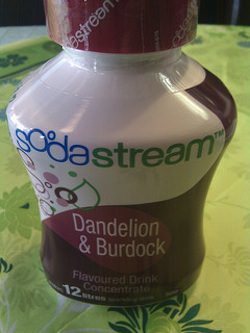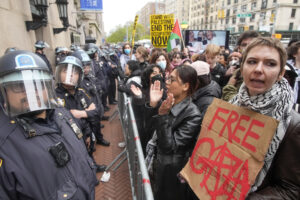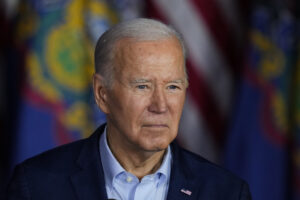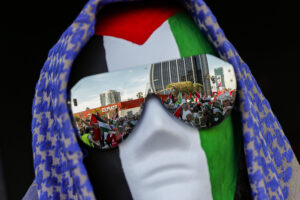Protesters Dispute SodaStream Company’s Claims
SodaStream has marketed itself as being beneficial to the Palestinian economy, but demonstrators take issue with that assertion.
By Thomas Hedges, Center for Study of Responsive Law
A group of 20 or so protesters stood outside of the Columbia Heights Target store in Washington, D.C., on Sunday urging consumers not to buy products from SodaStream, a company that manufactures home carbonation systems at a plant in what the demonstrators consider an illegal Israeli settlement in the Mishor Adumim industrial zone of the West Bank.
SodaStream has marketed itself as being beneficial to the Palestinian economy, but demonstrators have taken issue with that assertion. They argue that the company has built a plant in Mishor Adumim not for philanthropy, but because rent is low, Israel offers it special tax incentives, and the lack of enforcement and labor laws allows it to pay its workers the bare minimum.
“They’re not helping the Palestinian economy,” said Shelley Cohen Fudge, an organizer of the protest from Jewish Voice for Peace, one of the many faith-based organizations that make up Interfaith Boycott Coalition, which has launched a boycott campaign against SodaStream. “They’re helping the settlement economy.”
The coalition escalated its awareness efforts in reaction to the bombings of Gaza in late 2012. It intensified, Fudge says, after SodaStream paid $3.8 million for a Super Bowl ad, which didn’t wind up airing during this month’s game.
“[SodaStream’s] profits and expansion have been exponential,” Fudge said. “So we think this is the right time to raise awareness.”
The coalition draws much of its firepower from a January 2011 study by the organization Who Profits that found that little to none of the revenue coming out of SodaStream is infused into the Palestinian economy.
For example, SodaStream pays taxes to the Israeli government, not the Palestinian Authority, even though its plant is in West Bank territory, the study noted. Municipal taxes were found to be used for roads, education, sewage treatment, gardening and paying municipal employees — services that contribute to the growth of a settlement that is Jewish only.
As outsiders, Palestinians are subject to constant security checks, the study said. They commute to the industrial park and see none of that money back home.
Furthermore, items made at the SodaStream plant do little to serve the local population, according to the study, with 65 percent of production exported.
The manufacturing plant, built in 1996, includes metal and plastics factories, cylinder manufacturing and retest facilities and a CO2 refill line.
SodaStream founder Peter Wiseburgh said in a Globes magazine interview in 2000 that the lease holder offered him the site for free for six months. After that, it asked for 40,000 shekels rent per month, although coupling that deal with an offer of $100,000 cash for the cost of renovating the plant.
“It was a good deal,” he said. “Not a political act.”
Parallel to Wiseburgh’s reasoning was the registration statement from the company, which uses “risk factor” rather than benevolence or charity to determine whether it should place its plant on occupied territory. It was tax incentives and deductions, the Who Profits study suggests, that sold SodaStream on the idea of building its facilities in Mishor Adumim.
“[The plant] was designed to cut the north off from the south and to make it impossible for Palestinians to have freedom of movement,” Fudge said. “It needs to stop.”
This article was made possible by the Center for Study of Responsive Law.
Your support matters…Independent journalism is under threat and overshadowed by heavily funded mainstream media.
You can help level the playing field. Become a member.
Your tax-deductible contribution keeps us digging beneath the headlines to give you thought-provoking, investigative reporting and analysis that unearths what's really happening- without compromise.
Give today to support our courageous, independent journalists.






You need to be a supporter to comment.
There are currently no responses to this article.
Be the first to respond.